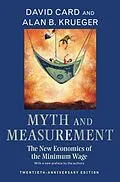From David Card, winner of the Nobel Prize in Economics, and Alan Krueger, a provocative challenge to conventional wisdom about the minimum wage
David Card and Alan B. Krueger have already made national news with their pathbreaking research on the minimum wage. Here they present a powerful new challenge to the conventional view that higher minimum wages reduce jobs for low-wage workers. In a work that has important implications for public policy as well as for the direction of economic research, the authors put standard economic theory to the test, using data from a series of recent episodes, including the 1992 increase in New Jersey's minimum wage, the 1988 rise in California's minimum wage, and the 1990-91 increases in the federal minimum wage. In each case they present a battery of evidence showing that increases in the minimum wage lead to increases in pay, but no loss in jobs.
A distinctive feature of Card and Krueger's research is the use of empirical methods borrowed from the natural sciences, including comparisons between the "treatment" and "control" groups formed when the minimum wage rises for some workers but not for others. In addition, the authors critically reexamine the previous literature on the minimum wage and find that it, too, lacks support for the claim that a higher minimum wage cuts jobs. Finally, the effects of the minimum wage on family earnings, poverty outcomes, and the stock market valuation of low-wage employers are documented. Overall, this book calls into question the standard model of the labor market that has dominated economists' thinking on the minimum wage. In addition, it will shift the terms of the debate on the minimum wage in Washington and in state legislatures throughout the country.
With a new preface discussing new data, Myth and Measurement continues to shift the terms of the debate on the minimum wage.
Autorentext
David Card, winner of the 2021 Nobel Prize in Economics, is Class of 1950 Professor of Economics at the University of California, Berkeley. Alan B. Krueger is Bendheim Professor of Economics and Public Affairs at Princeton University.
Inhalt
Preface to the Twentieth-Anniversary Edition ix
Preface xxvii
Chapter 1 Introduction and Overview 1
Chapter 2 Employer Responses to the Minimum Wage: Evidence from the Fast-Food Industry 20
Chapter 3 Statewide Evidence on the Effect of the 1988 California Minimum Wage 78
Chapter 4 The Effect of the Federal Minimum Wage on Low-Wage Workers: Evidence from Cross-State Comparisons 113
Chapter 5 Additional Employment Outcomes 152
Chapter 6 Evaluation of Time-Series Evidence 178
Chapter 7 Evaluation of Cross-Section and Panel-Data Evidence 208
Chapter 8 International Evidence 240
Chapter 9 How the Minimum Wage Affects the Distribution of Wages, the Distribution of Family Earnings, and Poverty 276
Chapter 10 How Much Do Employers and Shareholders Lose? 313
Chapter 11 Is There an Explanation? Alternative Models of the Labor Market and the Minimum Wage 355
Chapter 12 Conclusions and Implications 387
References 401
Index 415
